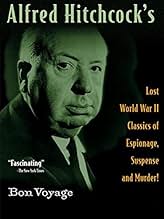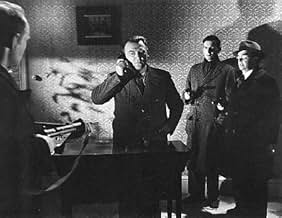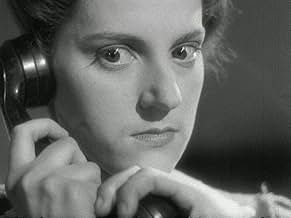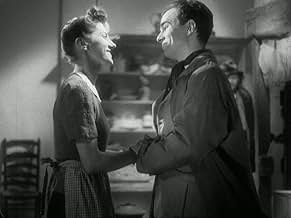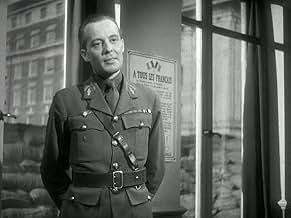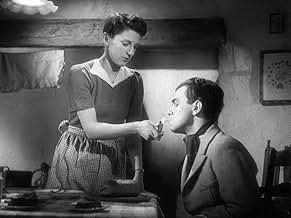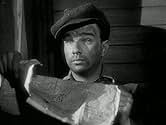IMDb RATING
6.1/10
2.1K
YOUR RATING
A young Scottish R. A. F. Gunner is debriefed by French officials about his escape from occupied territory, and in particular one person who may or may not have been a German Agent.A young Scottish R. A. F. Gunner is debriefed by French officials about his escape from occupied territory, and in particular one person who may or may not have been a German Agent.A young Scottish R. A. F. Gunner is debriefed by French officials about his escape from occupied territory, and in particular one person who may or may not have been a German Agent.
- Director
- Writers
- Stars
- Director
- Writers
- All cast & crew
- Production, box office & more at IMDbPro
6.12.1K
1
2
3
4
5
6
7
8
9
10
Featured reviews
Hitchcock propaganda film
"Bon Voyage" is a very short propaganda film about the French resistance which Hitchcock did for the war effort in 1944. It was met with disappointment and later shelved.
The only person billed is John Blythe; the rest are called "The Moliere Players" to protect them from the Nazis.
Blythe plays a Scottish RAF Sgt. John Dougall. He is being debriefed about his escape from France by French intelligence officers in London.
Dougall has escaped from a prisoner of war camp along with Stefan Godowski, who actually put the plan together. The two stick together until there is a Resistance-aided pick-up in France by plane. But only one can go, so they shoot dice for it. Dougall is the one to leave.
Upon meeting with the Intelligence agents, Dougall says that he hopes Godowski made it and wants to know what happened. As it turns out, although the agents wanted Dougall's story about how he was helped along the way, they already knew it.
Good story, but it was too low-key for what the government wanted from Hitchcock - a real rah-rah story and big ending concerning the Resistance.Instead, it showed ordinary people taking risks, which I found moving and effective.
An old woman I knew was in Vienna studying just before the war broke out and, for academic reasons, went looking for Heinrich Mann, who was hiding out in France. (And I just saw a film about this very thing, Varian's War). On the beach, she saw a man and woman playing ball on the beach, and the ball kept landing near her. They turned out to be members of the Resistance.
I believe she did find Mann in a bar somewhere, but what impressed her (and me) is that this couple told her that they would never quit their work until Nazism was defeated.
In the end, I think Hitchcock told the right story. It's not the big triumph but the work that people do leading up to it, sometimes small things, that win a war.
The only person billed is John Blythe; the rest are called "The Moliere Players" to protect them from the Nazis.
Blythe plays a Scottish RAF Sgt. John Dougall. He is being debriefed about his escape from France by French intelligence officers in London.
Dougall has escaped from a prisoner of war camp along with Stefan Godowski, who actually put the plan together. The two stick together until there is a Resistance-aided pick-up in France by plane. But only one can go, so they shoot dice for it. Dougall is the one to leave.
Upon meeting with the Intelligence agents, Dougall says that he hopes Godowski made it and wants to know what happened. As it turns out, although the agents wanted Dougall's story about how he was helped along the way, they already knew it.
Good story, but it was too low-key for what the government wanted from Hitchcock - a real rah-rah story and big ending concerning the Resistance.Instead, it showed ordinary people taking risks, which I found moving and effective.
An old woman I knew was in Vienna studying just before the war broke out and, for academic reasons, went looking for Heinrich Mann, who was hiding out in France. (And I just saw a film about this very thing, Varian's War). On the beach, she saw a man and woman playing ball on the beach, and the ball kept landing near her. They turned out to be members of the Resistance.
I believe she did find Mann in a bar somewhere, but what impressed her (and me) is that this couple told her that they would never quit their work until Nazism was defeated.
In the end, I think Hitchcock told the right story. It's not the big triumph but the work that people do leading up to it, sometimes small things, that win a war.
Excellent Hitchcock Short Feature
"Bon Voyage" is a short, French-language film, one of two such features that Alfred Hitchcock made during World War II as a tribute to the French Resistance. It will be of special interest to fans of the great director, but it is also an interesting, exciting story that is worthwhile in its own right.
As the story opens, we meet a young Scottish pilot from the RAF who has successfully escaped German-occupied territory with help from the resistance. He is being de-briefed about his experiences by intelligence officials, and he goes back and relates for them (and for the audience) his exciting story. Then, in the second half, the officials take him back through the same events, to reveal some astounding surprises.
It is all nicely done in fine Hitchcock fashion. It is very much like a good episode from "Alfred Hitchcock Presents", and is about the same length.
Hitchcock fans should not miss "Bon Voyage", as there is nothing else quite like it in his movie credits. It is also a good story that should be of at least some interest to anyone interested in World War II films or spy dramas.
As the story opens, we meet a young Scottish pilot from the RAF who has successfully escaped German-occupied territory with help from the resistance. He is being de-briefed about his experiences by intelligence officials, and he goes back and relates for them (and for the audience) his exciting story. Then, in the second half, the officials take him back through the same events, to reveal some astounding surprises.
It is all nicely done in fine Hitchcock fashion. It is very much like a good episode from "Alfred Hitchcock Presents", and is about the same length.
Hitchcock fans should not miss "Bon Voyage", as there is nothing else quite like it in his movie credits. It is also a good story that should be of at least some interest to anyone interested in World War II films or spy dramas.
Far superior to Aventure Malgache, if not classic Hitchcock
Coming from someone who considers Alfred Hitchcock her all-time favourite director, both Aventure Malgache and Bon Voyage are interesting curiosities but neither see Hitchcock at his best. While I didn't think much of Aventure Malgache, Bon Voyage was very well-done and you can see why Hitchcock himself was fond of it. The script is lacking in tautness and has a tendency to plod and a couple of the flashbacks flow a little too stiffly, even with those there is much to recommend. While Bon Voyage doesn't quite have Hitchcock all over it or see him show what he was most good at, there is more evidence of his directing style than in Aventure Malgache, the suspense levels are not exactly strong but Bon Voyage is not dull either and has some fun to it. The camera work is clever and meticulously composed and the crisp black and white also impresses. The score is a good mix of haunting and playful, while the story is simpler, much less confused and has some nice twists and turns. Unlike Aventure Malgache, Bon Voyage thankfully is not too dialogue heavy, the French are portrayed more sensitively and the propaganda elements, while also on the dated side, more subtly handled. John Blythe is decent in the lead role. To conclude, not a classic but it is not bad at all and of Hitchcock two French shorts he made in the 40s this is the far superior of the two. 7/10 Bethany Cox
Worthy for the message of support but dull and undistinguished otherwise
I have read a couple of message board comments on this film slating another reviewer (who didn't like it) for not understanding its "role" so for fear of upsetting those unable to cope with different opinions let me just say what I understand to be the case. Bon Voyage was one of two short films made by Hitchcock to encourage and bolster the French resistance by putting them at the core of the films and making them in French. It was an important gesture from the famous director and I'm sure was appreciated by those risking their lives in occupied France. However if all I am allow to comment on is its "role" then I should stop the review there.
Fortunately for me, the sight of a "0 of 10 users found this review useful" slogan doesn't bother me at all, so I will do what I normally do and just state my opinion and move on. Other than the war-effort significance, there is not much to this film to recommend it for now. The plot is set up in a terribly stiff device of flashbacks which puts a lot of pressure of the narration another device that doesn't totally work. The story itself has a few twists but the delivery does suck the life out of them and, contrary to what others might say, there isn't much in the way of classic Hitchcock to be had here. The end result is a plodding and simplistic tale that is dull and straightforward.
So by all means, let's hold up Bon Voyage as a worthy effort on the part of Hitchcock and give it its dues in regards supporting the resistance but please let's not pretend that it is a good film worth seeking out because it most certainly is not.
Fortunately for me, the sight of a "0 of 10 users found this review useful" slogan doesn't bother me at all, so I will do what I normally do and just state my opinion and move on. Other than the war-effort significance, there is not much to this film to recommend it for now. The plot is set up in a terribly stiff device of flashbacks which puts a lot of pressure of the narration another device that doesn't totally work. The story itself has a few twists but the delivery does suck the life out of them and, contrary to what others might say, there isn't much in the way of classic Hitchcock to be had here. The end result is a plodding and simplistic tale that is dull and straightforward.
So by all means, let's hold up Bon Voyage as a worthy effort on the part of Hitchcock and give it its dues in regards supporting the resistance but please let's not pretend that it is a good film worth seeking out because it most certainly is not.
Viewer beware
Disclaimer: This review is based on versions of Bon Voyage and Aventure Malgache as seen on Turner Classic Movies. These versions were copyrighted 1993, and I'm assuming they are the same versions previously available on VHS and more recently on DVD. The following criticism is aimed at saving people much grief and money. If someone has seen the DVD and can disqualify any of my remarks, I welcome you to do so. There are so few accurate reviews of obscure DVDs.
Alfred Hitchcock made Bon Voyage and Aventure Malgache (Madagascar Adventure) in 1944 to help the war effort by encouraging the French Resistance. The only people who have ever heard of these short films are Hitchcock fanatics, but even the most die-hard fans need not waste any time looking for these rarities. There is little in Bon Voyage and nothing in Aventure Malgache to indicate the hand of Hitchcock. Both films are in French and suffer from boring framing stories hung with flashbacks and constant voice-over narration. It is unlike Hitch to use so much dialog and the subtitles are difficult to read. The white lettering is hard to read against lighter parts of the background and at least half of the subtitles in Bon Voyage are cropped off the bottom of the screen.
Aventure Malgache tells of the French Resistance smuggling people out of Nazi-controlled Madagascar and is a completely forgettable film. Bon Voyage is more interesting. It tells of a British flier who has escaped from a POW camp. He is traveling with another escaped POW and helped by the Resistance, but there are double-crosses and murder in their path. However, only the murder scenes look like Hitchcock while the other scenes are very static. There is minimal camera movement and when the actors aren't sitting around talking they are shuffling around like zombies. The cropped subtitles leave viewers guessing at many of the finer details. Many references to passwords, place-names, and other important details (something about a cigarette used as a signal) are completely illegible. Bon Voyage does include the "old Gestapo trick" that Martin Landau mentions near the end of North By Northwest, but this is the only connection I could see to Hitch's other films.
If the DVD is significantly better than what I have described (new subtitles in yellow, for instance), please write a review saying so. It is very hard to find detailed reviews of obscure foreign films on DVD. Now I'm going to go critique the 1990 version of Cyrano.
Alfred Hitchcock made Bon Voyage and Aventure Malgache (Madagascar Adventure) in 1944 to help the war effort by encouraging the French Resistance. The only people who have ever heard of these short films are Hitchcock fanatics, but even the most die-hard fans need not waste any time looking for these rarities. There is little in Bon Voyage and nothing in Aventure Malgache to indicate the hand of Hitchcock. Both films are in French and suffer from boring framing stories hung with flashbacks and constant voice-over narration. It is unlike Hitch to use so much dialog and the subtitles are difficult to read. The white lettering is hard to read against lighter parts of the background and at least half of the subtitles in Bon Voyage are cropped off the bottom of the screen.
Aventure Malgache tells of the French Resistance smuggling people out of Nazi-controlled Madagascar and is a completely forgettable film. Bon Voyage is more interesting. It tells of a British flier who has escaped from a POW camp. He is traveling with another escaped POW and helped by the Resistance, but there are double-crosses and murder in their path. However, only the murder scenes look like Hitchcock while the other scenes are very static. There is minimal camera movement and when the actors aren't sitting around talking they are shuffling around like zombies. The cropped subtitles leave viewers guessing at many of the finer details. Many references to passwords, place-names, and other important details (something about a cigarette used as a signal) are completely illegible. Bon Voyage does include the "old Gestapo trick" that Martin Landau mentions near the end of North By Northwest, but this is the only connection I could see to Hitch's other films.
If the DVD is significantly better than what I have described (new subtitles in yellow, for instance), please write a review saying so. It is very hard to find detailed reviews of obscure foreign films on DVD. Now I'm going to go critique the 1990 version of Cyrano.
Did you know
- TriviaApart from John Blythe, all of the other actors in this short movie were French, and were simply credited as "The Molière Players" in order to protect their families from the Nazis.
- Quotes
Free French Colonel: [Last words] It's a dreadful business. Perhaps there'll be another tomb one day under the Arc de Triomphe: The Unknown Civilian.
- Alternate versionsThere is an Italian edition of this film on DVD, distributed by DNA Srl: "LIFEBOAT (1944) + BON VOYAGE (1944)" (2 Films on a single DVD), re-edited with the contribution of film historian Riccardo Cusin. This version is also available for streaming on some platforms.
- ConnectionsFeatured in WatchMojo: Top 10 War Propaganda Films (2014)
Details
- Runtime
- 26m
- Color
- Aspect ratio
- 1.37 : 1
Contribute to this page
Suggest an edit or add missing content

